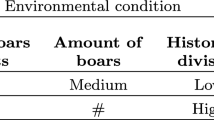Abstract
Nash equilibrium in many cases is not the best choice for human players. In case of trust games the Nash equilibrium is often mutual defection which is the worst possible outcome for all players. The Berge-Zhukovskii equilibrium models a more cooperative behavior, so in case of trust games, when players gain by cooperating, it is usually a better choice than Nash equilibrium. Real life results show that players rarely follow the theoretical predictions. Our aim is to find new equilibria types that offer a more realistic modeling of human players. The fuzzy Nash–Berge-Zhukovskii equilibrium is proposed which is a fuzzy combination of the Nash and Berge-Zhukovskii equilibrium. Several continuous trust games are investigated. Numerical results indicate that fuzzy Nash–Berge-Zhukovskii equilibrium is suitable to model real-life situations.
Access this chapter
Tax calculation will be finalised at checkout
Purchases are for personal use only
Preview
Unable to display preview. Download preview PDF.
Similar content being viewed by others
References
Deb, K., Agrawal, S., Pratab, A., Meyarivan, T.: A Fast and Elitist Multi-Objective Genetic Algorithm: NSGA-II KanGAL Report No. 200001, Indian Institute of Tehnology Kanpur (2000)
Dumitrescu, D., Lung, R.I., Mihoc, T.D., Nagy, R.: Fuzzy Nash-Pareto Equilibrium: Concepts and Evolutionary Detection. In: Di Chio, C., Cagnoni, S., Cotta, C., Ebner, M., Ekárt, A., Esparcia-Alcazar, A.I., Goh, C.-K., Merelo, J.J., Neri, F., Preuß, M., Togelius, J., Yannakakis, G.N. (eds.) EvoApplicatons 2010. LNCS, vol. 6024, pp. 71–79. Springer, Heidelberg (2010)
Dumitrescu, D., Lung, R.I., Nagy, R., Zaharie, D., Bartha, A., Logofătu, D.: Evolutionary Detection of New Classes of Equilibria: Application in Behavioral Games. In: Schaefer, R., Cotta, C., Kołodziej, J., Rudolph, G. (eds.) PPSN XI, Part II. LNCS, vol. 6239, pp. 432–441. Springer, Heidelberg (2010)
Gaskó, N., Dumitrescu, D., Lung, R.I.: Evolutionary detection of Berge and Nash equilibria. In: Nature Inspired Cooperative Strategies for Optimization, NICSO 2011, pp. 149–158 (2011)
Lung, R.I., Dumitrescu, D.: Computing Nash Equilibria by Means of Evolutionary Computation. Int. J. of Computers, Communications & Control, 364–368 (2008)
Murphy, R., Rapoport, A., Parco, J.: The breakdown of cooperation in iterative real-time trust dilemmas. Experimental Economics 9(2), 147–166 (2006)
Nash, J.F.: Non-cooperative games. Annals of Mathematics 54, 286–295 (1951)
Radner, R., Myerson, R., Maskin, E.: An Example of a Repeated Partnership Game with Discounting and with Uniformly Inefficient Equilibria. Review of Economic Studies 1, 59–69 (1986)
Rosenthal, Robert, W.: Games of perfect information, predatory pricing and the chain-store paradox. Journal of Economic Theory 25, 92–100 (1981)
Storn, R., Price, K.: Differential evolution - a simple and efficient heuristic for global optimization over continuous spaces. Journal of Global Optimization 11, 341–359 (1997)
Zhukovskii, V.I.: Linear Quadratic Differential Games, Naukova Doumka, Kiev (1994)
Author information
Authors and Affiliations
Editor information
Editors and Affiliations
Rights and permissions
Copyright information
© 2012 Springer-Verlag Berlin Heidelberg
About this paper
Cite this paper
Nagy, R., Gaskó, N., Lung, R.I., Dumitrescu, D. (2012). Between Selfishness and Altruism: Fuzzy Nash–Berge-Zhukovskii Equilibrium. In: Coello, C.A.C., Cutello, V., Deb, K., Forrest, S., Nicosia, G., Pavone, M. (eds) Parallel Problem Solving from Nature - PPSN XII. PPSN 2012. Lecture Notes in Computer Science, vol 7491. Springer, Berlin, Heidelberg. https://doi.org/10.1007/978-3-642-32937-1_50
Download citation
DOI: https://doi.org/10.1007/978-3-642-32937-1_50
Publisher Name: Springer, Berlin, Heidelberg
Print ISBN: 978-3-642-32936-4
Online ISBN: 978-3-642-32937-1
eBook Packages: Computer ScienceComputer Science (R0)




